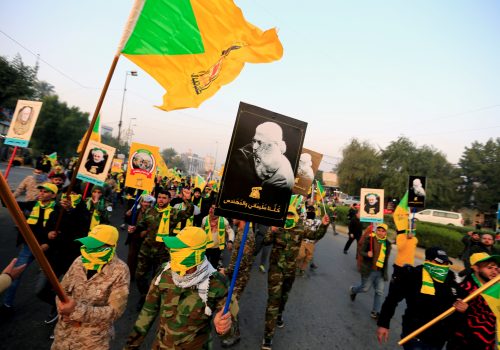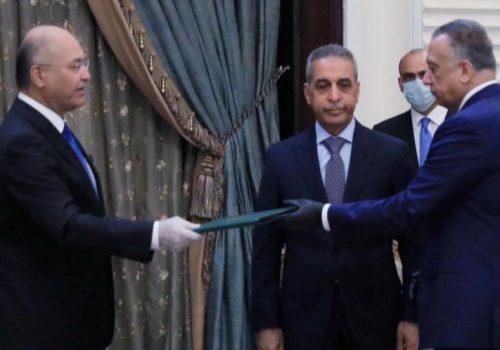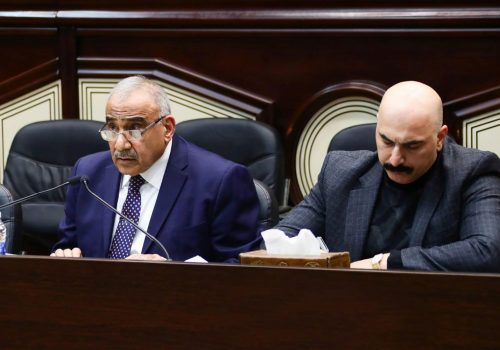Under a Raisi presidency, ties with Iraq will still matter
On June 19, Judiciary Chief Ebrahim Raisi won the Iranian presidential election in a historically low turnout election with 17.9 million votes. Raisi has been the chief justice since 2019 and has formerly held several other posts in Iran’s judicial branch since the 1979 Islamic Revolution.
A principlist president, who is known to be closely aligned with and trusted by Supreme Leader Ayatollah Ali Khamenei, the Islamic Revolutionary Guard Corps (IRGC), a principlist-led parliament, and other key institutions of power, is likely to be less strained both in his domestic and foreign policies. According to Iranian law, all major foreign policy decisions must gain approval from the Supreme Leader, however, the president and his administration can be fundamental and influential figures. Thus, the likelihood of an administration that will put Iran in a unitary system of governance dominated by principlist centers of power facilitates a unified vision on Iran’s policy toward neighboring Iraq and the broader region.
Raisi, an ambitious figure who has been floated as a prospective successor to Khamenei, is also likely to be granted more decision-making autonomy while aiming to appease his conservative factions. This includes the IRGC to manage the Iraqi dossier or an appeal to the Supreme Leader to acknowledge classical state foreign policy institutions to handle Iran-Iraq and regional relations.
The overthrow of dictator Saddam Hussein in 2003 was a turning point in Iraq’s foreign relations. In the final decade of its tyrannical rule, the Ba’athist regime increasingly turned Iraq into a pariah state regionally and beyond the Middle East. From the six countries that share a border with Iraq, only Jordan maintained good terms with Saddam’s regime. The 1980-1988 Iran-Iraq War and its aftermath kept the neighboring countries apart for more than two decades, and Iraqi relations with Syria were afflicted by mutual hostility from the outset of the Ba’ath Party rule in the two countries. On the other hand, Iraqi relations with Saudi Arabia and Kuwait were mostly amicable for mutually opportunistic reasons. There was a clear indication that Saddam would fight Iran on their behalf and Saddam needed their support in financing the Iran-Iraq War, facilitating his survival during the conflict. But his invasion of Kuwait in 1991 ended the tolerant relations between Iraq and his Gulf Arab friends.
The 2003 regime change should have corrected Iraq’s abnormal relations with its neighbors and ushered in a new era of regional cooperation and peace. However, the opposite was true in several cases. In Syria, President Bashar al-Assad suspected that his own Ba’athist rule would be next up for regime change and began to act as a malicious spoiler. He facilitated much of the financial support that was sent to the terrorist groups in western and central Iraq—mostly money raised from the Gulf Arab states—and even allowed his country to be a safe passage for foreign terrorists to Iraq. Despite its strong relations with the United States and partly due to pressure, Saudi Arabia refused to embrace the new Iraqi government because it believed that it was under the control of Iran—a neglect that only increased Iranian influence in Iraq. Additionally, Riyadh’s open support for continued turmoil in Iraq was publicized in Saudi media, mosques, and other forms of public discourse, as then-Saudi King Abdullah viewed a Shia-led Iraq as antithetical to his government’s interests.
Iran was the only exception to this regional rule. Its injurious history with Iraq notwithstanding, the Iranian government made a complete political, economic, and social turn toward Iraq after 2003. Diplomatic relations were restored, trade relations were launched on a rising trajectory to the point of making Iran third among Iraq’s trade partners, and, through its close Iraqi allies, the Iranian government secured a strong position in Iraqi internal affairs. Iran also extended its relations beyond the Shia political blocs and established mutual interests with some influential Sunni and Kurdish political leaders. Thanks to the reluctance of other major regional actors to embrace the new Iraqi political reality, Iran was working inside Iraq without virtually any serious regional competition.
From an Iranian perspective of its threat perceptions and recalling the horrors of the Iran-Iraq War, Iraq must never again be a missile launching pad against Iran, or, if it must be, then the missiles will be Iranian. To ensure this vision, Iran’s leadership established three tracks of relations with Iraq.
The first track was a traditional government-to-government relationship through normal diplomatic and institutional engagement. The second has been intensive public diplomacy that involved opening Iranian borders to Iraqi travelers regardless of their purpose, be it tourism, medical treatment, or pilgrimages to Shia shrines. This policy has made Iran a preferred destination for Iraqi travelers, as travel to other neighboring countries ranged from very difficult to impossible. Moreover, while other countries continue to increase the visa hardship for Iraqis, Iran signed an agreement with Iraq to waive visa fees for their respective travelers. The third track was a complex security engagement with a plethora of political blocs and their militant wings—a few of which were either established in Iran or thrived in post-2003 Iraq with Iranian support. This engagement was made through the IRGC and its foreign arm, the Quds Force. The balance between the first and third track has been lopsided in favor of the latter, because of the urgency of the security concerns and the fact that state-to-state relations have been firmly established from the early years of regime change in Iraq.
Under a Raisi government, Iraq is likely to see a continuation of these Iranian policies. For Baghdad, it will be essential to maintain friendly relations with the new Iranian administration and its other neighbors, particularly in regard to efforts to normalize relations with Saudi Arabia. With the recent Baghdad-hosted talks between the antagonistic neighbors, Iraq seems a natural venue for the two regional rivals to sort out their differences and bridge a divide that has often spilled over or played out into Iraqi territory. Although no immediate breakthrough appears in the short-term and risks of derailment remain with Iraq facing numerous domestic challenges, regional countries—like Oman and Qatar—as well as the West should quietly support Baghdad’s mediation efforts.
Dr. Abbas Kadhim is director of the Atlantic Council’s Iraq Initiative. Follow him on Twitter @DrAbbasKadhim.
Masoud Mostajabi is an associate director at the Atlantic Council’s Middle East Programs. Follow him on Twitter @MMostajabi1.
Image: A supporter of presidential candidate Ebrahim Raisi holds a posters of him during an election rally in Tehran, Iran June 16, 2021. Majid Asgaripour/WANA (West Asia News Agency) via REUTERS


